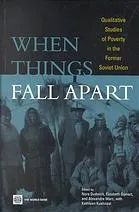When Things Fall Apart : Qualitative Studies of Poverty in the Former Soviet Union
4.0
Reviews from our users

You Can Ask your questions from this book's AI after Login
Each download or ask from book AI costs 2 points. To earn more free points, please visit the Points Guide Page and complete some valuable actions.Introduction
"When Things Fall Apart: Qualitative Studies of Poverty in the Former Soviet Union" is a richly detailed exploration of how economic, social, and political upheavals left countless individuals and families grappling with survival in the aftermath of the Soviet Union's collapse. Authored by Nora Dudwick, Elizabeth Gomart, and Alexandre Marc, this profound work delves into the voices of people whose stories often go unheard in broader discussions of economic reform and political transformation. By blending qualitative research methodologies with personal narratives, the book unveils how poverty penetrates lives in profound and unexpected ways. This is not merely a study of policy failure but a meditation on resilience, adaptation, and the human cost of systemic disintegration.
As the Soviet Union dissolved in 1991, it left a complex and fragmented legacy. The transition to market economies and the new socio-political realities ushered in both challenges and opportunities. However, for millions, this period represented a descent into uncertainty. Economic safety nets crumbled, state-supported services deteriorated, and communities experienced waves of dislocation and despair. Through meticulous fieldwork and narratives from the ground, the authors examine the ripple effects on households, neighborhoods, and individuals. They move beyond surface statistical data, uncovering the emotional and existential dimensions of poverty, and asking deeper questions about identity, hope, and agency in times of upheaval.
Detailed Summary of the Book
When Things Fall Apart is divided into thematic explorations of the multifaceted nature of poverty in the former Soviet Union. By focusing on personal testimonies collected through interviews and ethnographic studies, the book presents a nuanced and intimate look at how the disintegration of state structures created vulnerabilities for various populations. Villages, towns, and urban centers are transformed into case studies, displaying both despair and ingenuity.
The authors weave comparisons among different post-Soviet countries to highlight commonalities and divergences in the poverty experience. While some regions coped better due to historical ties to informal economies or external aid, others buckled under pre-existing structural weaknesses. Specific themes include unemployment, gender disparities, access to healthcare, and food security. The book shines a light on the daily practices of coping, such as bartering, migrating for seasonal work, or relying on familial networks to survive. This approach underlines how human resilience often operates at the intersection of creativity and desperation.
Despite the struggles detailed in the book's pages, hope occasionally surfaces through the solidarity of communities, grassroots initiatives, and informal safety nets. However, these moments are juxtaposed with accounts of alienation, friction, and mistrust. Ultimately, the book does not shy away from asking difficult questions about systemic inequality and the role of governance, reform initiatives, and external actors in exacerbating or alleviating people's suffering.
Key Takeaways
- Qualitative research allows for deeper understanding of how systemic changes manifest at household and individual levels.
- Poverty in the former Soviet Union is rooted in the collapse of state structures and institutional frameworks, creating vulnerabilities that persist to this day.
- Community and familial networks are invaluable in navigating economic hardship, but they often fail to compensate for widespread systemic collapse.
- The emotional toll of poverty, including feelings of shame, powerlessness, and mistrust, is as significant as the material aspects of deprivation.
- Policy responses need to prioritize voices from the ground, ensuring that reforms target not just macroeconomic indicators but also human well-being.
Famous Quotes from the Book
"Poverty is not simply a lack of material wealth. It is a fracturing of the social and emotional fabric that leaves individuals stranded, disconnected, and voiceless."
"When the security of the state eroded, it was not just jobs or incomes that were lost. It was a sense of belonging, of being part of a system that, however imperfect, provided predictability."
"At the heart of every story of resilience is a story of struggle, and understanding one without the other provides only a partial picture."
Why This Book Matters
When Things Fall Apart stands out as a vital contribution to the discourse on poverty, governance, and economic transitions in post-Soviet societies. At a time when quantitative metrics dominated policy discussions, this book highlights the importance of qualitative approaches in understanding lived realities. By focusing on the human stories behind economic decline, the authors shift the conversation from abstract theories to the tangible impacts of systemic collapse.
Policymakers, researchers, and students of development economics, sociology, and political science will find this book indispensable for its methodological rigor and empathetic approach. It challenges stereotypes about poverty by contextualizing it within historical and structural frameworks, urging institutions to address the root causes of deprivation. Furthermore, the book sheds light on the resilience of ordinary people who adapt, innovate, and persevere even under dire circumstances. In doing so, it inspires a call to action—one rooted in compassion, transparency, and accountability.
In an era of increasing inequality and complex global challenges, the lessons from When Things Fall Apart remain as relevant as ever, reminding us to reevaluate policies and practices through the lens of human dignity and social justice.
Free Direct Download
You Can Download this book after Login
Accessing books through legal platforms and public libraries not only supports the rights of authors and publishers but also contributes to the sustainability of reading culture. Before downloading, please take a moment to consider these options.
Find this book on other platforms:
WorldCat helps you find books in libraries worldwide.
See ratings, reviews, and discussions on Goodreads.
Find and buy rare or used books on AbeBooks.


